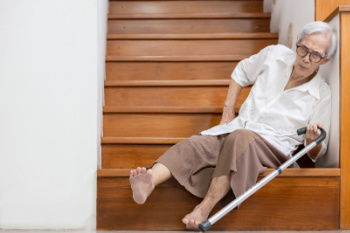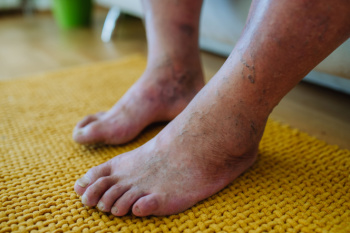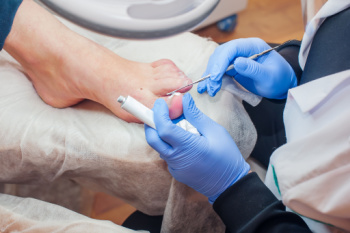

Falls are a common risk among seniors and can lead to serious injuries, including fractures and hospitalization. Foot problems, such as weakness in the ankles, instability in the toes, or wearing improper footwear, significantly increase the likelihood of falls. Falls among seniors can often result from reduced foot strength or balance issues that stem from conditions like arthritis or neuropathy. A podiatrist can play a vital role in preventing falls in this age group by addressing foot-related concerns. This foot doctor can evaluate gait and recommend proper footwear that provides better grip and support. A podiatrist also can treat or manage other conditions that affect stability, such as corns, bunions, or poorly fitted orthotics. Regular checkups can help identify problems early, improve mobility and reduce the risk of falling. Maintaining strong, stable feet and ankles is essential for safety and independence among seniors. If you are a senior at risk of falling, it is suggested that you schedule an appointment with a podiatrist for guidance.
Preventing falls among the elderly is very important. If you are older and have fallen or fear that you are prone to falling, consult with Dr. Edward D. Hutson from Easton, PA. . Our doctor will assess your condition and provide you with quality advice and care.
Every 11 seconds, an elderly American is being treated in an emergency room for a fall related injury. Falls are the leading cause of head and hip injuries for those 65 and older. Due to decreases in strength, balance, senses, and lack of awareness, elderly persons are very susceptible to falling. Thankfully, there are a number of things older persons can do to prevent falls.
How to Prevent Falls
Some effective methods that older persons can do to prevent falls include:
Falling can be a traumatic and embarrassing experience for elderly persons; this can make them less willing to leave the house, and less willing to talk to someone about their fears of falling. Doing such things, however, will increase the likelihood of tripping or losing one’s balance. Knowing the causes of falling and how to prevent them is the best way to mitigate the risk of serious injury.
If you have any questions, please feel free to contact our offices located in Easton, and Northampton, PA . We offer the newest diagnostic and treatment technologies for all your foot care needs.

For those individuals managing diabetes, attentive foot care is imperative to preventing complications. Elevated blood sugar can reduce circulation and sensation, making feet more vulnerable to injuries and slow healing. Simple measures like inspecting feet daily for cuts, redness, or swelling can catch issues early. Choose shoes with a proper fit to avoid pressure points or blisters and avoid walking barefoot to prevent unnoticed injuries. Keep skin hydrated with lotion Skip the areas between toes to prevent fungal growth. Routine toenail trimming, without cutting too close, reduces the risk of ingrown nails. Partnering with a podiatrist ensures early detection and treatment of concerns like ulcers or infections. If you have diabetes, it is suggested that you have regular foot checkups with a podiatrist who can provide tailored advice, protecting your mobility and health.
Diabetic foot care is important in preventing foot ailments such as ulcers. If you are suffering from diabetes or have any other concerns about your feet, contact Dr. Edward D. Hutson from Easton, PA. . Our doctor can provide the care you need to keep you pain-free and on your feet.
Diabetic Foot Care
Diabetes affects millions of people every year. The condition can damage blood vessels in many parts of the body, especially the feet. Because of this, taking care of your feet is essential if you have diabetes, and having a podiatrist help monitor your foot health is highly recommended.
The Importance of Caring for Your Feet
Patients with diabetes should have their doctor monitor their blood levels, as blood sugar levels play such a huge role in diabetic care. Monitoring these levels on a regular basis is highly advised.
It is always best to inform your healthcare professional of any concerns you may have regarding your feet, especially for diabetic patients. Early treatment and routine foot examinations are keys to maintaining proper health, especially because severe complications can arise if proper treatment is not applied.
If you have any questions please feel free to contact our offices located in Easton, and Northampton, PA . We offer the newest diagnostic and treatment technologies for all your foot and ankle needs.

Achilles tendinopathy is a common foot and ankle issue caused by overuse of the Achilles tendon. It can be classified into two types, which are insertional, where the tendon attaches to the heel, and non-insertional, which impacts the middle portion of the tendon. While both cause pain, swelling, and stiffness, insertional tendinopathy often involves discomfort at the back of the heel, while non-insertional pain is felt higher up along the tendon. If left untreated, the tendon can go through non-healing stages known as reactive tendinopathy, or early swelling and pain, tendon disrepair, and degenerative tendinopathy, causing long-term damage with thickening and weakness. Proper treatment includes rest, targeted exercises, and addressing any biomechanical issues. If you are experiencing persistent pain in your Achilles tendon, it is suggested that you see a podiatrist for an accurate diagnosis and an effective treatment plan.
Achilles tendon injuries need immediate attention to avoid future complications. If you have any concerns, contact Dr. Edward D. Hutson of Easton, PA. . Our doctor can provide the care you need to keep you pain-free and on your feet.
What Is the Achilles Tendon?
The Achilles tendon is a tendon that connects the lower leg muscles and calf to the heel of the foot. It is the strongest tendon in the human body and is essential for making movement possible. Because this tendon is such an integral part of the body, any injuries to it can create immense difficulties and should immediately be presented to a doctor.
What Are the Symptoms of an Achilles Tendon Injury?
There are various types of injuries that can affect the Achilles tendon. The two most common injuries are Achilles tendinitis and ruptures of the tendon.
Achilles Tendinitis Symptoms
Rupture Symptoms
Treatment and Prevention
Achilles tendon injuries are diagnosed by a thorough physical evaluation, which can include an MRI. Treatment involves rest, physical therapy, and in some cases, surgery. However, various preventative measures can be taken to avoid these injuries, such as:
If you have any questions please feel free to contact our offices located in Easton, and Northampton, PA . We offer the newest diagnostic tools and technology to treat your foot and ankle needs.

An ingrown toenail develops when the edge of the nail grows into the surrounding skin, causing pain, swelling, and redness. This common condition often affects the big toe and can lead to infection if left untreated. Symptoms include tenderness, throbbing pain, and the presence of pus or drainage. The causes of ingrown toenails include improper nail trimming, wearing tight shoes, or trauma to the toe. People with certain foot shapes or conditions like diabetes may be at higher risk of ingrown toenails. Treatment options vary depending on severity. A wedge resection is a surgical procedure in which a small portion of the nail is removed to alleviate pressure. In some cases, partial toenail removal may be recommended to prevent recurrence. If you are experiencing pain from an ingrown toenail, a podiatrist can offer effective solutions, from conservative treatments to surgery. It is suggested that you schedule an appointment with this type of doctor for treatment and relief.
Ingrown toenails can become painful if they are not treated properly. For more information about ingrown toenails, contact Dr. Edward D. Hutson of Easton, PA. . Our doctor can provide the care you need to keep you pain-free and on your feet.
Ingrown Toenails
Ingrown toenails occur when a toenail grows sideways into the bed of the nail, causing pain, swelling, and possibly infection.
Causes
Prevention
Because ingrown toenails are not something found outside of shoe-wearing cultures, going barefoot as often as possible will decrease the likeliness of developing ingrown toenails. Wearing proper fitting shoes and using proper cutting techniques will also help decrease your risk of developing ingrown toenails.
Treatment
Ingrown toenails are a very treatable foot condition. In minor cases, soaking the affected area in salt or antibacterial soaps will not only help with the ingrown nail itself, but also help prevent any infections from occurring. In more severe cases, surgery is an option. In either case, speaking to your podiatrist about this condition will help you get a better understanding of specific treatment options that are right for you.
If you have any questions please feel free to contact our offices located in Easton, and Northampton, PA . We offer the newest diagnostic and treatment technologies for all your foot and ankle needs.

An ankle fracture affects more than just physical mobility. It can have psychological and social impacts too. Physically, an ankle fracture often requires immobilization, leading to muscle weakness, joint stiffness, and challenges with weight-bearing even after healing. Recovery may take months, with targeted exercises needed to regain strength. Psychologically, the prolonged healing process and limited independence may lead to frustration, anxiety, and even depression, especially for active individuals. Fear of re-injury can also affect confidence. Socially, disrupted routines and limited participation in work or hobbies may cause feelings of isolation. If you have sustained an ankle fracture, it is suggested that you schedule an appointment with a podiatrist as quickly as possible. This foot and ankle expert can guide you, focusing on both physical and emotional support, to make recovery smoother and help you regain a balanced, active lifestyle post-injury.
Broken ankles need immediate treatment. If you are seeking treatment, contact Dr. Edward D. Hutson from Easton, PA. . Our doctor can provide the care you need to keep you pain-free and on your feet.
Broken Ankles
A broken ankle is experienced when a person fractures their tibia or fibula in the lower leg and ankle area. Both of these bones are attached at the bottom of the leg and combine to form what we know to be our ankle.
When a physician is referring to a break of the ankle, he or she is usually referring to a break in the area where the tibia and fibula are joined to create our ankle joint. Ankles are more prone to fractures because the ankle is an area that suffers a lot of pressure and stress. There are some obvious signs when a person experiences a fractured ankle, and the following symptoms may be present.
Symptoms of a Fractured Ankle
If you suspect an ankle fracture, it is recommended to seek treatment as soon as possible. The sooner you have your podiatrist diagnose the fracture, the quicker you’ll be on the way towards recovery.
If you have any questions, please feel free to contact our offices located in Easton, and Northampton, PA . We offer the newest diagnostic and treatment technologies for all your foot care needs.